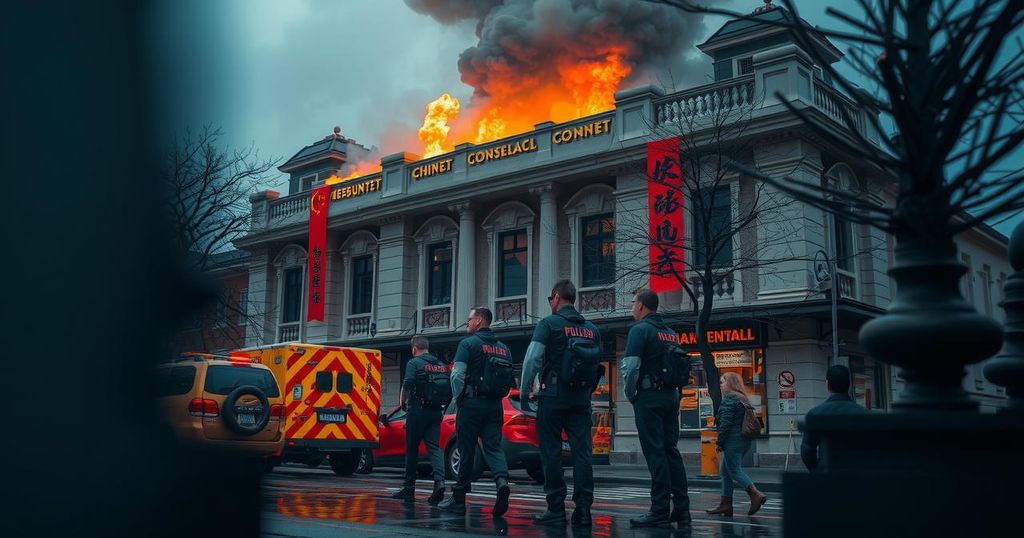China’s Xi Faces Dilemma As Consulate Blast Sparks Fear of Myanmar Chaos
China faces a complex dilemma following the attack on its consulate in Mandalay, Myanmar, highlighting an increasingly precarious balance of support between the military and ethnic armed groups. With the Myanmar military losing control of large territories, China is pressured to stabilize relationships as regional chaos looms, worried about the unpredictable consequences of a regime’s collapse.
China has long navigated a complex relationship with Myanmar, aiming to maintain influence over armed ethnic groups along its border while also supporting the military leadership of the nation. Recent events, particularly an explosion targeting the Chinese consulate in Mandalay, have heightened tensions and underscored the challenges of this balancing act. The attack, which involved an explosive device, prompted strong condemnation from the Myanmar military regime and led China to demand an investigation while lodging formal protests with Myanmar authorities. The motives behind the consulate attack remain unclear, yet it highlights the discontent among both the junta and pro-democracy factions regarding China’s actions under President Xi Jinping. Following the junta’s overthrow of Aung San Suu Kyi’s civilian government in 2021, Beijing’s perceived support of ethnic rebel groups has stirred resentment, particularly from Min Aung Hlaing, the military’s leader. In a bid to stabilize the situation and prevent a potential collapse of his regime, Hlaing has rebuked China’s earlier backing of operations against rebels, which resulted in significant gains for these groups. Chinese authorities have become increasingly concerned about the prospect of rebellion spreading uncontrollably, fearing that such chaos could have dire repercussions for their interests in the region. Richard Horsey, a senior advisor at the International Crisis Group, explained, “While it’s no fan of this regime, it definitely doesn’t want a disorderly kind of collapse of power in Naypyidaw because it doesn’t know what comes next. Unpredictable kinds of outcomes are not what they want.” Recent military setbacks for Hlaing’s forces have raised alarm about the junta’s grip on power. Reports indicate a significant loss of territories, with armed ethnic groups making notable advances, including the capture of Lashio in August, further threatening government control over key regions. This precarious position could lead to more organized attacks on major cities like Mandalay, fundamentally jeopardizing the military’s power base. In light of escalating conflicts, China has attempted to mediate a cease-fire but has faced challenges in maintaining its limited influence over the situation. Pro-democracy forces and ethnic groups have amassed greater strength, at times aligning with Chinese interests against cybercrime syndicates, which had exploited Chinese citizens. However, this has led to anti-China sentiments among military supporters, provoking protests against Beijing’s perceived interference. With ongoing regional instability, Chinese leadership has indicated a desire to strengthen relations with the junta, highlighted by the visit of Min Aung Hlaing to China, which would signal a significant diplomatic shift. Horsey noted that such an engagement could be a pivotal moment: “If he was to meet Xi Jinping, that would be an even more significant move. So, China’s trying to undo the damage.”
The article discusses the evolving dynamics between China and Myanmar amidst political turmoil following a military coup in 2021. Historically, China has sought to balance its influence over armed ethnic groups in Myanmar, while supporting the ruling military faction. The recent attack on the Chinese consulate reflects deteriorating relations and rising tensions, as both sides grapple with internal conflicts and external pressures. This context is crucial to understanding the complexities of China’s strategic interests in Myanmar, as well as the implications for regional stability.
In conclusion, the fragility of Myanmar’s current political landscape poses significant challenges not only for the nation’s internal stakeholders but also for external powers such as China. By demanding an investigation into the attack on its consulate and reaffirming its commitment to the incumbent military regime, China is attempting to mitigate the risks of an uncontrollable collapse of order. The situation remains fluid, with potential ramifications for both domestic stability in Myanmar and China’s regional power dynamics as it navigates its role in this protracted conflict.
Original Source: www.bangkokpost.com








Post Comment